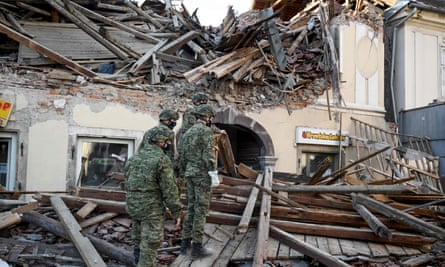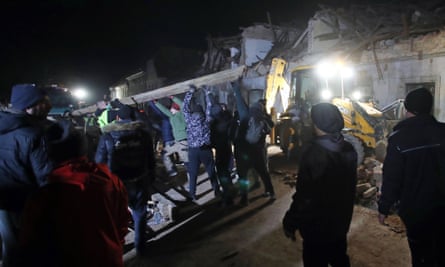At least seven people have been killed and dozens injured after a strong earthquake hit central Croatia, destroying buildings and sending panicked people fleeing into rubble-covered streets in a town south-east of the capital Zagreb.
The European Mediterranean Seismological Center said an earthquake of 6.4 magnitude hit 28 miles (46km) from Zagreb at 12.19pm, at a depth of 10km. Initial reports said the earthquake caused extensive damage, causing roofs, building facades and entire buildings to collapse.
Croatia’s prime minister, Andrej Plenkovic, said late on Tuesday that seven victims had been found so far and that there would “probably be more”.
Officials said a 12-year-old girl was killed in Petrinja, a town of some 25,000 people. Another six people were killed in a village close by, which was almost completely destroyed, according to the state HRT television. At least 26 people were hospitalised, two with serious injuries, officials said, adding that many more people remained unaccounted for.
In Petrinja, cries could be heard from beneath destroyed houses. One woman was found alive some four hours after the quake. Emergency teams used rescue dogs to hunt for survivors, while family members looked on in despair.
Six people were rescued from rubble with the help of dogs according to Croatia’s Mountain Rescue Service.
“My town has been completely destroyed. We have dead children,” the mayor of Petrinja Darinko Dumbovic said in a statement broadcast by HRT. “This is like Hiroshima – half of the city no longer exists.”

Marica Pavlovic, a resident, said the quake felt “worse than a war.”
“It was horrible, a shock, you don’t know what to do, whether to run out or hide somewhere,” she told the Associated Press.
“Even if we wanted to, we can’t go back in, there is no electricity,” she said, huddled with others in a downtown park, wrapped in blankets.”
Plenković, and other government ministers arrived in Petrinja after the earthquake. “The biggest part of central Petrinja is in a red zone, which means that most of the buildings are not usable,” Plenković said.
The army had 500 places ready in barracks to house people, he said while others would be accommodated in nearby hotels and other places. “No one must stay out in the cold tonight,” the prime minister said.
Officials also toured a damaged hospital in the nearby town of Sisak, which was also badly hit. Plenković said the patients would be evacuated in army helicopters and ambulances.
Health officials said a baby was delivered in a tent in front of the hospital in the aftermath of the earthquake.
The European commission president, Ursula von der Leyen, said on Twitter that she had spoken to Plenković and instructed an envoy to travel to Croatia as soon as possible.
After another powerful earthquake in Croatia, the 2nd in the past 2 days, I spoke with Prime Minister @AndrejPlenkovic again.
— Ursula von der Leyen (@vonderleyen) December 29, 2020
We are ready to support. I have asked @JanezLenarcic to stand ready to travel to Croatia as soon as the situation allows.
We stand with Croatia.
As a Mediterranean country, Croatia is prone to earthquakes, but big quakes are rare. The last strong one struck in the 1990s when the Adriatic town of Ston was badly damaged by a 6.0-magnitude quake.
The regional TV channel N1 reported live on Tuesday from Petrinja that a collapsed building had fallen on a car. The footage showed firefighters trying to remove the debris to reach the vehicle, buried underneath. A man and a small boy were eventually rescued.

Croatian seismologist Krešimir Kuk described the earthquake as “extremely strong”, far stronger than another quake that hit Zagreb and nearby areas in the spring. He warned people to keep out of potentially shaky, old buildings and to move to the newer areas of the city in case of aftershocks.
In the capital, people ran out into the streets and parks in fear. Many reportedly were leaving Zagreb, ignoring a travel ban imposed because of the coronavirus outbreak.
The earthquake was felt throughout the country and in neighbouring Serbia, Bosnia and Slovenia. It was even felt as far away as Graz in southern Austria, the Austria Press Agency reported.
Authorities in Slovenia said the Krško nuclear power plant was temporarily shut down following the earthquake. The power plant is jointly owned by Slovenia and Croatia and located near their border.
The Balkan region lies on major fault lines and sees regular earthquakes. Zagreb is still rebuilding from a 5.3-magnitude quake that struck in March, the most powerful to hit the capital in decades.